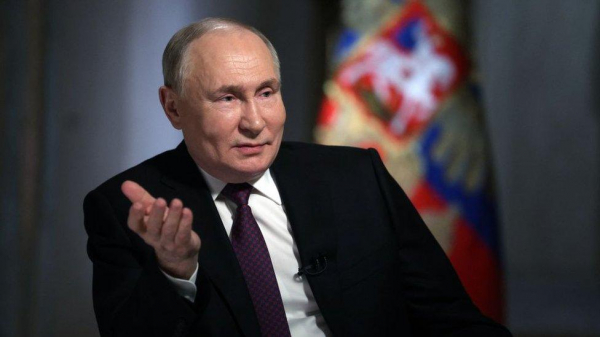Vladimir Putin Accuses Google of Pushing US Political Agenda Amid YouTube Tensions
In response to these pressures, YouTube has removed or flagged content that it deems to violate its guidelines, including videos related to Russian political ma
- by B2B Desk 2024-12-20 10:57:52
Russian President Vladimir Putin has leveled serious accusations against Google, claiming the tech giant is actively promoting a U.S. political agenda through its subsidiary, YouTube. The allegations come amid increasing tensions between Russia and the American tech industry, highlighting the ongoing global debate over the influence and regulation of major digital platforms.
Accusations of Political Bias
In a recent statement, Putin asserted that Google, through YouTube, is manipulating its content to favor U.S. political interests. He suggested that the platform's algorithms and policies are designed to amplify certain political messages while suppressing others, particularly those that might be unfavorable to American foreign policy or critical of the U.S. government.
"Google is not just a tech company; it is a tool of the American political machine," Putin said. "They are using YouTube to control the narrative and interfere in the internal affairs of other nations, including Russia."
Escalating Tensions with Tech Giants
This is not the first time Russia has clashed with major U.S.-based tech companies. Over the past few years, the Russian government has imposed numerous restrictions on platforms like Facebook, Twitter, and Google, accusing them of failing to comply with local laws and of bias against Russian content. The tensions have escalated to the point where Russia has threatened to ban these platforms outright if they do not adhere to its regulations.
In response to these pressures, YouTube has removed or flagged content that it deems to violate its guidelines, including videos related to Russian political matters. This has further fueled accusations from the Kremlin that the platform is selectively enforcing its rules to serve a political agenda.

The Impact on Russian Media
Russian authorities have also criticized YouTube for allegedly marginalizing state-sponsored media outlets. Channels such as RT (Russia Today) and Sputnik have faced demonetization, content warnings, and algorithmic downranking, which Russian officials argue is an attempt to limit their reach and influence.
"These platforms are silencing our voices," said a spokesperson for RT. "They are trying to control what people see and hear, and this is a direct attack on freedom of speech."
Global Implications
The conflict between Russia and Google reflects broader concerns about the power of tech giants and their role in shaping political discourse. Critics argue that companies like Google have too much control over the information ecosystem, allowing them to influence public opinion and political outcomes. These concerns are not limited to Russia; similar debates are taking place in the European Union, India, and other regions where governments are seeking to exert more control over digital platforms.
Google's Response
Google has consistently denied allegations of political bias, maintaining that its platforms operate based on clear, unbiased policies designed to promote a safe and inclusive environment for all users. In a statement, the company said, "We apply our policies consistently, regardless of political context or nationality. Our goal is to provide a platform for free expression while ensuring that our community standards are upheld."
Conclusion
As the digital landscape continues to evolve, the clash between national governments and global tech companies is likely to intensify. Putin's accusations against Google are part of a larger narrative about the power and responsibility of digital platforms in today's interconnected world. How these issues are resolved will have significant implications for the future of global communication, governance, and the balance of power between states and corporations.
Also Read: Beware of 'Digital Arrest' Scam: NPCI's Must-Know Tips to Protect Your Money and Identity
POPULAR POSTS
Loan EMIs to Drop as RBI Slashes Repo Rate - Full MPC December 2025 Highlights
by Shan, 2025-12-05 11:49:44
Zoho Mail vs Gmail (2025): Which Email Platform Is Best for Businesses, Startups, and Students?
by Shan, 2025-10-09 12:17:26
PM Modi Launches GST Bachat Utsav: Lower Taxes, More Savings for Every Indian Household
by Shan, 2025-09-24 12:20:59
$100K H-1B Visa Fee Explained: Trump’s New Rule, Clarifications & Impact on Indian Tech Workers
by Shan, 2025-09-22 10:11:03
India-US Trade Deal Soon? Chief US Negotiator Arrives in Delhi as Talks Set to Begin Tomorrow
by Shan, 2025-09-15 11:54:28
Modi Meets Xi: Trump’s Tariffs, Strategic Autonomy, and the Future of Asia’s Power Balance
by Shan, 2025-09-03 06:40:06
Google Claims Gemini AI Uses Just ‘Five Drops of Water’ Per Prompt, Sparks Debate
by Shan, 2025-08-22 12:34:27
RECENTLY PUBLISHED

Pine Labs IPO 2025: Listing Date, Grey Market Premium, and Expert Outlook
- by Shan, 2025-11-05 09:57:07

The Agentic Revolution: Why Salesforce Is Betting Its Future on AI Agents
- by Shan, 2025-11-05 10:29:23

Top 10 Insurance Companies in India 2026: Life, Health, and General Insurance Leaders Explained
- by Shan, 2025-10-30 10:06:42

OpenAI Offers ChatGPT Go Free in India: What’s Behind This Big AI Giveaway?
- by Shan, 2025-10-28 12:19:11

Best Silver Investment Platforms for 2025: From CFDs to Digital Vaults Explained
- by Shan, 2025-10-23 12:22:46





 Subscribe now
Subscribe now 